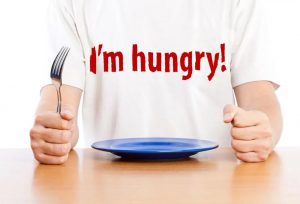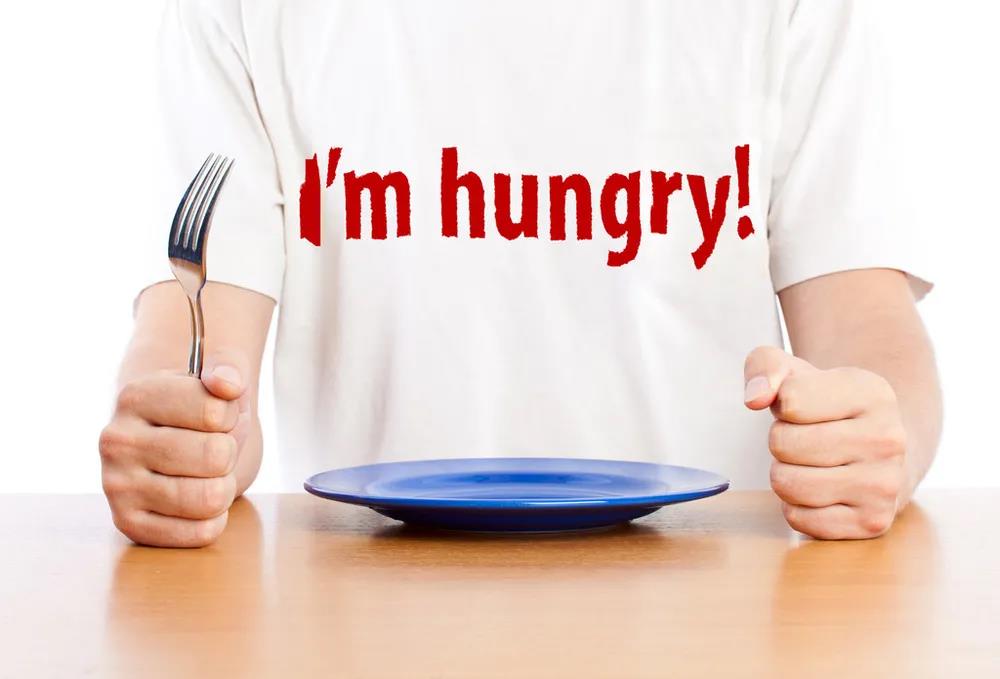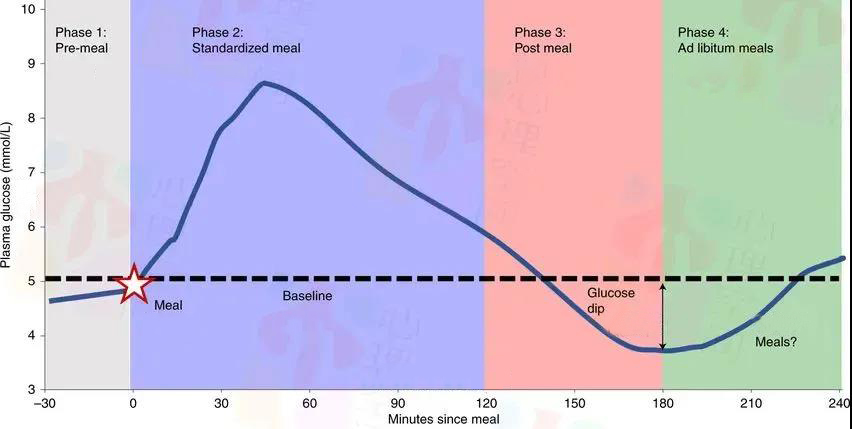
It wasn’t long before meal but when I saw the food I was hungry again; after the dinner party, I get hungry much faster than others…You may have experienced this kind of uncontrolled hunger.
Many people attribute this feeling to gluttony. In fact, a new study confirms that hunger may be the cause of blood sugar.

Let’s explain why some people are easier to get hungry than others, and show you a few ways to control your appetite.
Low blood sugar levels after meals will lead to stronger hunger
Recently, the well-known British journal Nature published a study in Nature Metabolism magazine, explaining why some people are always more hungry than others. This may be that blood sugar is controlling appetite.

The research was jointly carried out by experts from multiple countries including King’s College London, University of Leeds, Harvard Medical School, Massachusetts General Hospital, etc.
The research team collected detailed data on blood glucose responses and other health markers of 1,070 people after eating standardized breakfasts and freely chosen meals within two weeks. There were more than 8,000 breakfasts and more than 70,000 meals in total.
Standard breakfasts are mainly muffins. Under the premise of controlling the same calories, the composition of carbohydrates, protein, fat and fiber is different.

The experiment found that compared with participants with stable blood sugar, even if they ate the same last meal, people with a rapid drop in blood sugar had a 9% increase in hunger, and the time to eat the next meal was about 24 minutes earlier.
At the same time, such participants tended to consume 75 calories more in the 3-4 hours after breakfast, and about 312 more calories throughout the day. This type of diet may even cause a weight gain of 20 pounds (approximately 9 kilograms) in a year.
Research results show that blood glucose levels after meals may be a major obstacle for people to lose weight. A few hours after eating, people who have a sharp drop in their blood sugar levels will eventually become more hungry than others, and will further lead to hundreds of calories more energy intake than others.
6 benefits of moderate hunger
Eating too much will not only form a habit, but may also bring a lot of burden to the body due to obesity. And light fasting can achieve the goal of losing weight and improving metabolism.
Light fasting is also called “intermittent fasting”, which refers to eating normally sometimes and sometimes eating less. Some previous studies have confirmed the benefits of moderate “starvation” for human health.
Lose weight
The light fasting method has been included as one of the regular weight loss methods.
Adhere to light fasting 2 days a week can reduce the weight, body fat rate, waist-to-hip ratio of obese people. Most people will lose weight after a week of scientifically and reasonably restricting their diet.
Reduce “bad cholesterol”
Research published in the American Journal of Clinical Nutrition shows that light fasting can reduce “bad cholesterol” (low-density lipoprotein cholesterol) and triglyceride levels, but does not affect “good cholesterol” (high-density lipoprotein cholesterol) levels .
Help control blood sugar
A study published in the World Journal of Diabetes pointed out that light fasting is a safe dietary intervention that helps to improve fasting blood glucose and postprandial blood glucose levels.
Light fasting cannot effectively lower blood sugar in the short term, but it can improve insulin sensitivity and help prevent diabetes.
Promote blood circulation
Studies have pointed out that light fasting has the effect of promoting blood circulation and is conducive to enhancing the blood oxygen supply of body tissues.
Prevent Alzheimer’s
A study by the Johns Hopkins School of Medicine in the United States found that light fasting two days a week and controlling calorie intake have a positive effect on the brain and prevent Alzheimer’s disease (commonly known as “Alzheimer’s disease”) and Parkinson’s disease.
Reduce the risk of cancer
A study by Skidmore College in the United States found that light fasting is beneficial to reducing the level of oxidative stress in the body, and the level of oxidative stress is closely related to the occurrence and development of chronic diseases such as diabetes, heart disease and cancer.
5 tips to increase satiety
I don’t want to put the chopsticks until I eat, and I often get hungry and full…These habits can easily make the stomach lose control.
In fact, as long as you find the switch to control the “hunger sensation” and turn it off at the right time, you can keep your stomach feeling full and manage your weight well.
1. Choose high-fiber, low-fat foods
High-fiber foods, such as vegetables, fungi, fruits, coarse grains, etc., are masters at eliminating hunger, and are also recognized as low-calorie foods. Foods with high fiber content can fill the stomach and intestines and give people a feeling of “supporting”, that is, a strong feeling of fullness.

Crispy fried foods, sweet sugar cakes, high-fat burgers, barbecues, etc. are more likely to arouse appetite, making people eat a lot without knowing it, and the energy intake far exceeds the body’s needs.
On the contrary, low-fat foods, such as white meat such as fish, shrimp, chicken, or lean red meat, contain lower fat and high protein, which makes the feeling of fullness last longer.
2. Have a snack between meals
There are two points in the day, and most people feel a little hungry more or less. One is around 10:30 in the morning, when the human body’s metabolism becomes faster, and the other is around 16:00, when the glucose content in the body has been reduced. At these two time points, you can add meals and choose some healthy snacks.
The best snacks are low-energy, satiety foods, such as milk, yogurt, soy milk or nuts. In addition, you can also eat a small amount of dried fruits, which are rich in fiber and minerals, which can help prevent hunger and control appetite.
3. Change the dish order
The traditional meal order is usually: meat, vegetables, staple food, soup, dessert or fruit. This sequence is not healthy, and it is not good for appetite control.
For people with healthy stomach, you might as well eat refreshing fresh fruits first, then drink a small bowl of appetizer soup, and then eat vegetable dishes to fill the stomach. At this time, the staple food is served, and finally fish and meat dishes. It can not only ensure the intake of sufficient dietary fiber, but also avoid excessive fat and other foods, and ensure a balanced diet.
4. Slow down eating
It usually takes about 20 minutes for the brain nerves to receive the signal of fullness. That is to say, if you finish a meal in a hurry in less than this time, the brain will not have time to remind you that you are full, resulting in an actual energy intake exceeding the standard.
Chewing slowly and swallowing can prolong the meal time, stimulate the satiety nerve center, and feed back to the brain “I’m full”. Therefore, we will feel full earlier and stop eating.
Another measure of chewing and slow swallowing is the number of chews per mouthful of rice. Generally speaking, it is best to ensure that each mouthful is not less than 5 times. Foods that are not easy to chew should be increased accordingly.
5. Eat a fixed amount for three meals
If you want to control your weight, the most common mistake is to omit a meal. But facts have proved that a full meal cannot reduce energy intake at all. Because people tend to be more inclined to high-oil and high-sugar foods when they are hungry, they will eat harder and lose control easily.
The meal time should be as regular as possible. Under normal circumstances, breakfast is arranged from 6:30 to 8:30, lunch is from 11:30 to 13:30, and dinner is from 18:00 to 20:00.
Because when people eat, the digestive system will be mobilized to secrete digestive juices. For a long time, the brain and stomach will turn on the memory function and start to work when the meal is reached.
If you do not eat at this time, gastric acid is easy to cause irritation and cause gastrointestinal diseases such as gastritis. Moreover, time is chaotic, the digestive system does not know when to go to work, and the switch of hunger and fullness is more difficult to control.
Comments